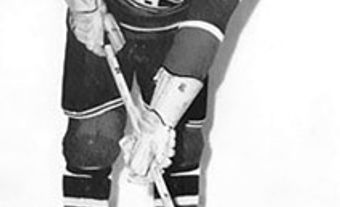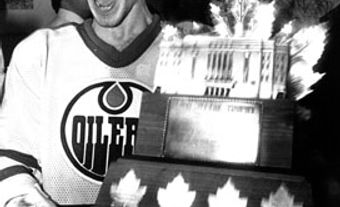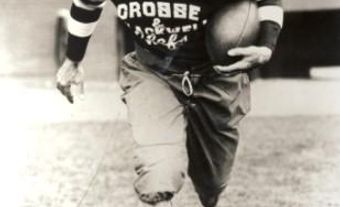Patrick John Joseph Burns, police officer, hockey coach (born 4 April 1952 in Saint-Henri, QC; died 19 November 2010 in Sherbrooke, QC). Burns is regarded as one of the National Hockey League’s best coaches, having won three Jack Adams Awards for coaching as well as the Stanley Cup in 2003 with the New Jersey Devils. He was inducted into the Hockey Hall of Fame in 2014.
Early Life
Burns was the son of Irish-Canadian father Alfred Burns and French-Canadian mother Louise Geraldeau. He was the youngest of six children (Violet, Alfred Jr., Lillian, Phyllis, and Diane). Burns spent his early years in Saint-Henri, a working-class French and Irish-immigrant neighbourhood in Montréal, until the family moved to Chateauguay. After his father died following an accident, Burns, his mother, and his sister Diane moved to Gatineau, Québec.
Burns played organized hockey while growing up, and was passionate about music — he taught himself how to play guitar and later formed a garage band.
Policing Career
After withdrawing from high school following grade 10, Burns registered at the Ottawa Technical School to study welding. However, he dropped out to join the Ottawa Police Force, despite the fact he was only 17 and had to lie about his age. According to Rosie DiManno’s biography of Burns, his mother convinced the Gatineau police chief to hire her son on the local force instead. In 1970, Burns began his 16-year policing career in Gatineau.
Early Coaching Career
Burns started coaching part-time in the 1970s, first with bantam players and then in a midget league. His work in minor hockey was noticed by the Hull Olympiques (now the Gatineau Olympiques) of the Quebec Major Junior Hockey League (QMJHL), who offered him a part-time scouting job for the 1978–79 season.
In 1983, Burns accepted an assistant coaching position with the Hull Olympiques, while maintaining his full-time job with the Gatineau Police Force. By the 1984–85 season, Burns had become the head coach and general manager of the Olympiques and was forced to take a leave of absence from policing.
When his one-year sabbatical turned into two, Burns had to decide between coaching and policing. The Olympiques owner at the time, Wayne Gretzky, assured Burns that he would be coaching in the National Hockey League one day. Following this vote of confidence from “the Great One,” Burns retired from the police force after 16 years of service.
With Burns as head coach, the Olympiques finished first overall in the 1985–86 regular season and won the QMJHL championship, defeating the Drummondville Voltiguers and capturing the President’s Cup, the first in franchise history. As QMJHL champions, the Olympiques competed for the Memorial Cup in Portland, Oregon, but lost to the Ontario Hockey League’s Guelph Platers in the final. The team made it to the playoffs the following season (1986–87), but lost in the first round.
International Coaching
In 1987, Burns was appointed as an assistant coach for Canada’s IIHF World Junior Championship team. Held in Piestany, Czechoslovakia, the tournament is infamous for the “Punch-Up in Piestany,” which saw both Canada and the Soviet Union ejected from the tournament following a bench-clearing brawl.
Three years later, in the summer of 1991, Burns would be chosen as assistant coach, under Mike Keenan, for the Canada Cup tournament. The Canadian team went undefeated, earning six wins and two ties en route to the championship.
Professional Coaching
In 1987, Burns was approached by Serge Savard, general manager of the Montreal Canadiens, about coaching the team’s minor league affiliate in Sherbrooke. Burns accepted the offer in June 1987 and began coaching professionally in the American Hockey League.
In Sherbrooke, Burns showed he was not afraid to challenge other coaches and even referees, and verbal shouting matches were a frequent occurrence. With his players, Burns was regarded as tough, but fair.
He was with Sherbrooke for one season before he landed the big job in Montréal. On 8 June 1988, Burns was appointed as the head coach of the Canadiens — at age 36, the youngest in franchise history.
Montreal Canadiens
Under Burns, the 1988–89 Canadiens finished first in the Adams Division with 115 points, boasting an impressive 53–18–9 record. During the playoffs, the Canadiens went to the Stanley Cup Final but lost to the Calgary Flames in a six-game series. Burns’ impressive NHL season debut earned him the Jack Adams Award, presented annually to the league’s best coach.
Burns coached three more seasons with the Canadiens but resigned following the 1991–92 season. He later intimated that the decision had been motivated by his tumultuous relationship with the Montréal media. During his four seasons with the Canadiens, he tallied a 174–104–42 record.
Toronto Maple Leafs
Following his departure from Montréal, Burns was courted by the Los Angeles Kings but opted to take a coaching position with the Toronto Maple Leafs. When he joined the Leafs, he became only the second individual to coach both Toronto and Montréal, two of the most fabled Original Six franchises (Dick Irvin was the first).
Burns made an immediate impact in Toronto. In the two years prior to his arrival, the team had failed to qualify for the playoffs. In his first season (1992–93), Burns steered the Leafs to a 44–29–11 regular season record and a Conference Finals berth against the Los Angeles Kings. The Leafs were defeated in a controversial seven-game series but the series marked the team’s longest postseason run since they won the Stanley Cup in 1967. In the offseason, Burns was awarded his second Jack Adams Award.
The following season, Burns guided the Leafs back to the Conference Finals but lost to the Vancouver Canucks in five games. His third year with the team was limited by a lockout and the Leafs were eliminated in the first round of the postseason.
The following year, Burns was dismissed by Toronto with 17 games remaining in the 1995–96 season — at that point, the Leafs were 25–30–10 and had suffered their longest winless streak in five seasons. Overall, Burns’ regular season coaching record with the Leafs was 133–107–41.
Boston Bruins
After leaving Toronto, Burns took a year away from the game and then joined the Boston Bruins in 1997. In his first season with Boston, the team finished second in the Northeast Division but was eliminated in the first round of the playoffs.
In the offseason, Burns won his third Jack Adams Award. This distinction not only gave Burns the most Jack Adams wins in league history but also made him the only coach to have won the award with three different teams.
Burns coached another two full seasons with the Bruins before being fired during the 2000–01 season, to be replaced by Mike Keenan.
New Jersey Devils
Burns was hired as head coach of the New Jersey Devils for the 2002–03 season. According to Lou Lamoriello, president and general manager of the Devils, Burns was hired because of his bench coaching and the way he held his players accountable.
After finishing first in the Atlantic Division, New Jersey rolled through the playoffs before defeating the Mighty Ducks of Anaheim in a tough seven-game series in the Finals. The victory gave Burns a Stanley Cup championship. He returned the following season and guided the Devils to a 100-point season; however, the team was eliminated in the first round of the playoffs.
Death and Legacy
Burns was forced to resign from coaching following a diagnosis of colon cancer in 2004. He successfully battled the disease but developed liver cancer the following year. In 2009, his colon cancer returned and later metastasized to his lungs. He died on 19 November 2010 in Sherbrooke, Québec.
Burns is widely regarded one of the best coaches in NHL history. In 1,019 regular season games, Burns recorded 501 wins, 353 losses, 161 ties, and 14 overtime losses. As of April 2015, he was ranked 20th among NHL coaches in the number of total wins.
Burns was posthumously inducted into the Hockey Hall of Fame in 2014. His wife, Line, and children, Maureen and Jason, attended the induction ceremony.
Prior to his passing, thousands had petitioned to see him inducted into the Hall of Fame. Lou Lamoriello, general manager of the New Jersey Devils during Burns’ tenure, told author Mike Commito on 6 April 2015 that, “Pat lived through what was more important to him than the Hall of Fame and that was winning the Stanley Cup.” In fact, Burns had requested that his ashes be placed in a replica Stanley Cup urn.
In the spring of 2011, the Pat Burns Arena opened in the town of Stanstead, Québec, on the grounds of Stanstead College.

 Share on Facebook
Share on Facebook Share on X
Share on X Share by Email
Share by Email Share on Google Classroom
Share on Google Classroom


